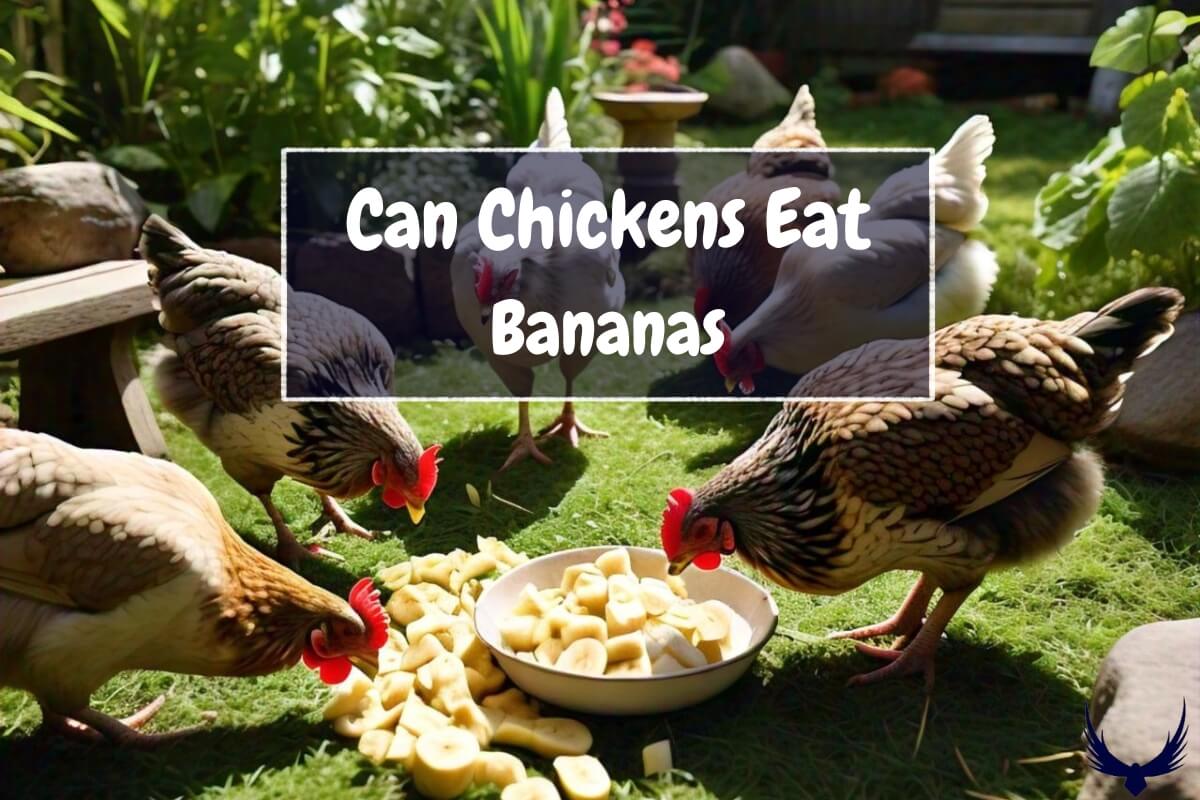Chickens like to eat a variety of foods, including vegetables and fruits. Some people feed their chickens bananas, but others are unsure if it’s safe.
Can Chickens Eat Bananas without getting sick? Let’s find out.
Can Chickens Eat Bananas?
Chickens can safely eat bananas as part of a balanced diet. Bananas are a nutritious fruit that provide vitamins, minerals, and fiber which can support various aspects of chicken health.
Bananas should be offered in moderation due to their high sugar content. It’s best to serve them as occasional treats rather than a staple food.
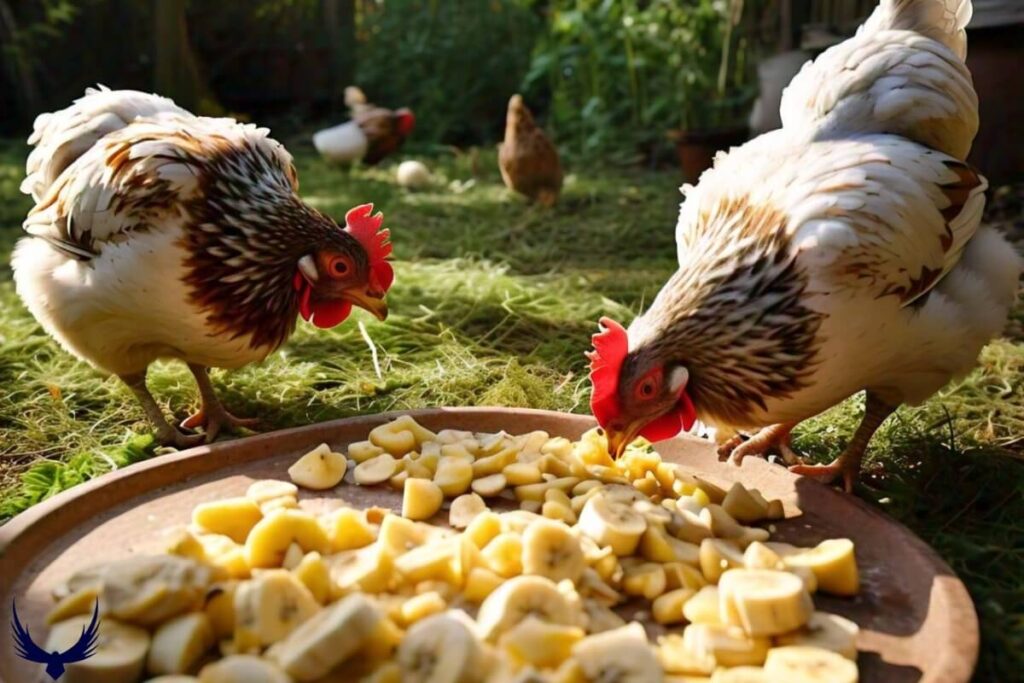
When feeding bananas to chickens, it’s advisable to remove the peel and cut the fruit into small pieces to prevent choking. Both ripe and slightly unripe bananas are suitable, though chickens may prefer the sweeter taste of ripe ones.
Bananas can be a healthy addition to a chicken’s diet, but they should not replace the primary feed to meet their nutritional needs.
Nutritional Benefits of Bananas for Chickens
Bananas have several nutritional benefits for chickens:
Vitamins
Vitamin B6 (Pyridoxine): It supports chicken protein metabolism and helps in the formation of red blood cells.
Vitamin C: It boosts the chicken immune system and aids in stress management.
Vitamin A: It supports vision, growth, and immune function.
Vitamin B1 (Thiamine): It aids in carbohydrate metabolism and nervous system function.
Vitamin B2 (Riboflavin): It is important for energy production and feather health in chickens.
Vitamin B3 (Niacin): It supports metabolism and helps to maintain healthy skin.
Vitamin B9 (Folate): It is crucial for cell growth and egg production.
Minerals
Potassium: It regulates fluid balance, muscle function, and nerve signals.
Magnesium: It supports bone health and egg production.
Copper: It aids in iron absorption and red blood cell formation.
Manganese: It is important for bone formation and metabolic processes.
Selenium: It’s an antioxidant that supports immune function.
Antioxidants
Dopamine: It acts as an antioxidant and may have anti-inflammatory properties.
Catechins: Powerful antioxidants that can help protect chicken cells from damage.
Other Nutrients
Fiber: Fiber in Bananas such as Pectin aids digestion and promotes gut health.
Resistant Starch: May act as a prebiotic, supporting beneficial gut bacteria.
Carbohydrates: Bananas are rich in easily digestible carbohydrates, providing quick energy for chickens.
Benefits for Chickens
Energy Boost: The natural sugars provide quick energy.
Digestive Health: Fiber content supports gut health and digestion.
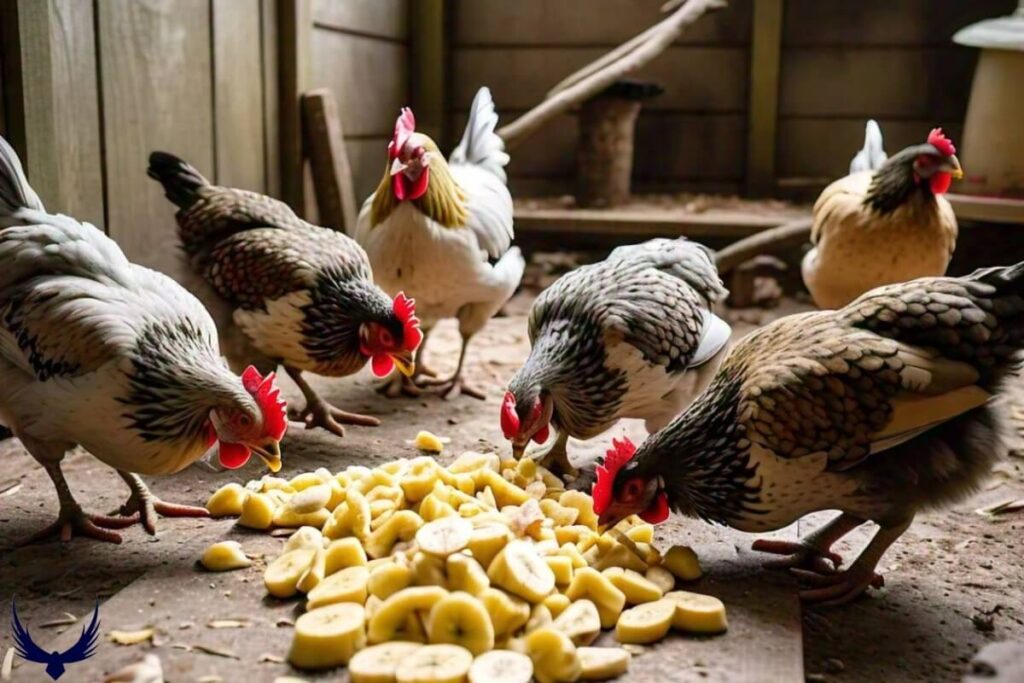
Egg Production: Nutrients like folate and vitamin B6 support egg production.
Feather Health: Vitamins and minerals contribute to healthy feather growth.
Stress Reduction: Vitamin C and B vitamins can help manage stress.
Immune Support: Antioxidants and vitamins boost the immune system.
Muscle Function: Potassium aids in proper muscle function.
Bone Health: Minerals like magnesium contribute to strong bones.
What Parts of Bananas Can Chickens Eat?
Chickens can eat the following part of bananas:
Banana Flesh: Chickens can safely eat ripe or slightly unripe banana flesh. It is highly nutritious. Cut it into small pieces to prevent choking.
Banana Peel: Banana peels can be eaten by chickens, but it’s better to avoid them. They are tough to digest and might have pesticides. If you do give banana peels to your chickens, make sure to wash them well and cut them into tiny pieces. It’s safest to only use organic bananas without pesticides.
Banana Leaves: Banana leaves are safe for chickens to peck at and can provide enrichment and foraging opportunities. They are not very nutritious but also not harmful.
Banana Stem: Banana stem is tough and fibrous, so it’s not usually fed to chickens. If you do give it to them, chop it finely.
Banana Flowers: Banana flowers are safe for chickens to eat. They are not easy to find, but you can give them to your chickens if you have some.
How to Feed Bananas to Chickens?
Here is a guide on how to feed bananas to chickens including preparation and serving methods:
Preparation
Washing: Thoroughly wash the banana to remove any pesticides or dirt before feeding to chickens if you want to feed them peel.
Ripeness: Choose ripe or slightly overripe bananas for easier digestion. Chickens like overripe bananas because they are softer and sweeter.
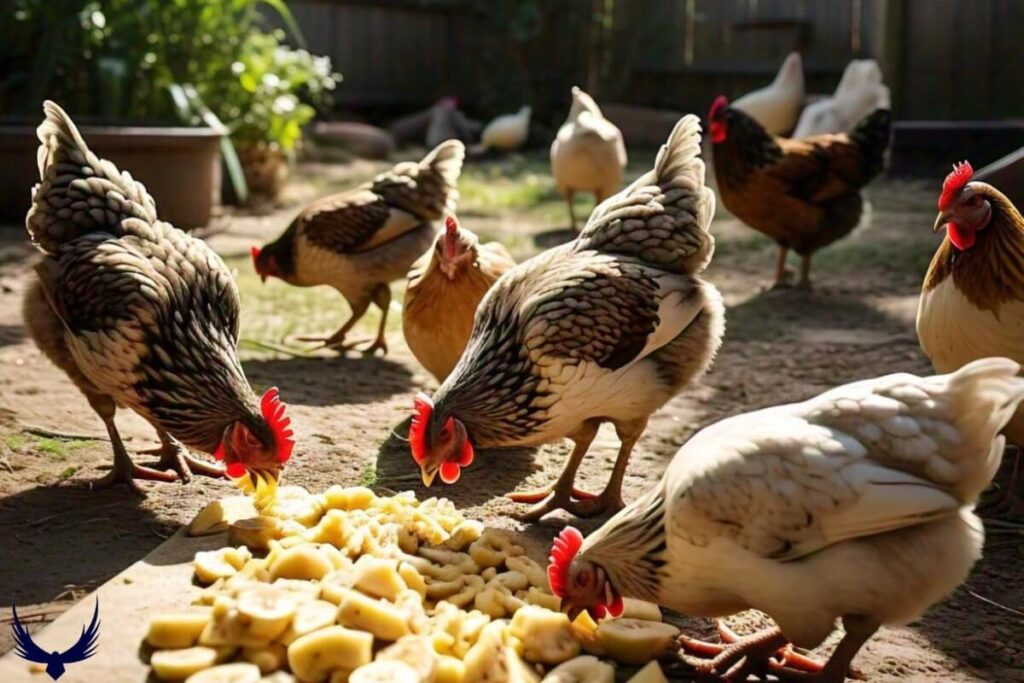
Peeling: It’s usually better to take off the peel before feeding the chickens. If feeding them peel, make sure it’s organic and free of pesticides.
Cutting: Cut bananas into small pieces. For small chickens, cut into 1 to 2-inch chunks.
Serving Methods
Hand feeding: Feed chickens by hand with small pieces of bananas. This helps shy chickens become more friendly.
Scatter feeding: Scatter feed small banana pieces in the run or coop to encourage natural foraging behavior.
Mixed in feed: Mix mashed banana with regular feed to encourage picky eaters or give medication.
Mixing with other foods: Mix bananas with fruits (Kiwi, Apple, Strawberries, Oranges, and Grapes) and Vegetables (Celery, Jalapenos, Broccoli, and Tomatoes) to introduce variety and provide additional nutrients. Chop the Bananas and mix them with other treats such as Mushrooms.
Frozen treats: Make frozen treats by freezing banana slices. Frozen bananas can be a cool snack on a hot day. Put them in ice cube trays with water to make banana ice blocks.
Mashed on a board: Spread mashed banana on a flat board so that multiple chickens can peck at it at the same time.
Banana Chips: Banana chips can be given as treats. Make sure banana chips are unsweetened and not coated with extra sugar or preservatives. Give them in moderation because they have a lot of sugar.
How Often Can Chickens Have Bananas?
Here’s a detailed guide on how often chickens can have bananas, including frequency and quantity recommendations:
Frequency: Bananas should be considered an occasional treat and offered only once or twice a week. Adult chickens can have bananas 2 to 3 times a week. Chicks over 6 weeks can have them once a week in small amounts. Avoid giving bananas to chicks under 6 weeks old.

Adjust the frequency based on the chicken’s weight and health. Give more to underweight or stressed birds, and less to overweight or chickens with digestive problems.
Quantity: Limit treats like bananas to 10% of a chicken’s diet. Small breeds can have 1 to 2 small slices, while large breeds can have 2 to 3 slices. For a flock of 6 chickens, give them 1 to 2 medium bananas. Chicks over 6 weeks can have a small piece of banana (size of a pea).
Risks of Feeding Bananas to Chickens
Following are the potential risks of feeding bananas to chickens:
Nutritional Imbalance: Feeding too many bananas to chickens can cause a nutritional imbalance. Chickens might eat too many bananas and not enough of their balanced feed, leading to potential nutrient deficiencies.
Excess Sugar Intake: Bananas are high in natural sugars. Too much sugar from bananas can cause obesity and health problems. This can lead to weight gain, lower egg production, and possible metabolic disorders.
Digestive Upset: Digestive upset can happen when a new food is introduced or when a pet is overfed. This can lead to problems like diarrhea. The result can be dehydration, discomfort, and possible infections.
Choking Hazard: Bananas can be a choking hazard for chicks because the large pieces can get stuck in their throat leading to suffocation or injury.
Calcium Absorption Issues: Excessive banana consumption might interfere with calcium absorption. This could lead to problems with eggshell strength and bone health. Chickens might end up with thin eggshells or weaker bones.
Things to Consider Before Feeding Bananas to Chickens
Following are the points to consider before feeding bananas to chickens:
Mold and Spoilage: Always check bananas for mold before giving them to chickens. Throw away any bananas with mold. It’s okay to give chickens overripe bananas, but don’t give them rotten or fermenting ones. Store bananas properly to prevent premature spoilage.
Pesticide Exposure: Pesticides on bananas can be harmful for chickens. Use organic bananas to avoid pesticides. Wash bananas well before giving them to chickens. Peel the bananas to lower pesticide exposure.
Can Baby Chicks Eat Bananas?
Baby chicks can eat banana, but it’s important to be careful and wait until they are 7 to 8 weeks old. When introducing banana, start with very small amounts – a piece about the size of a pea for each chick.
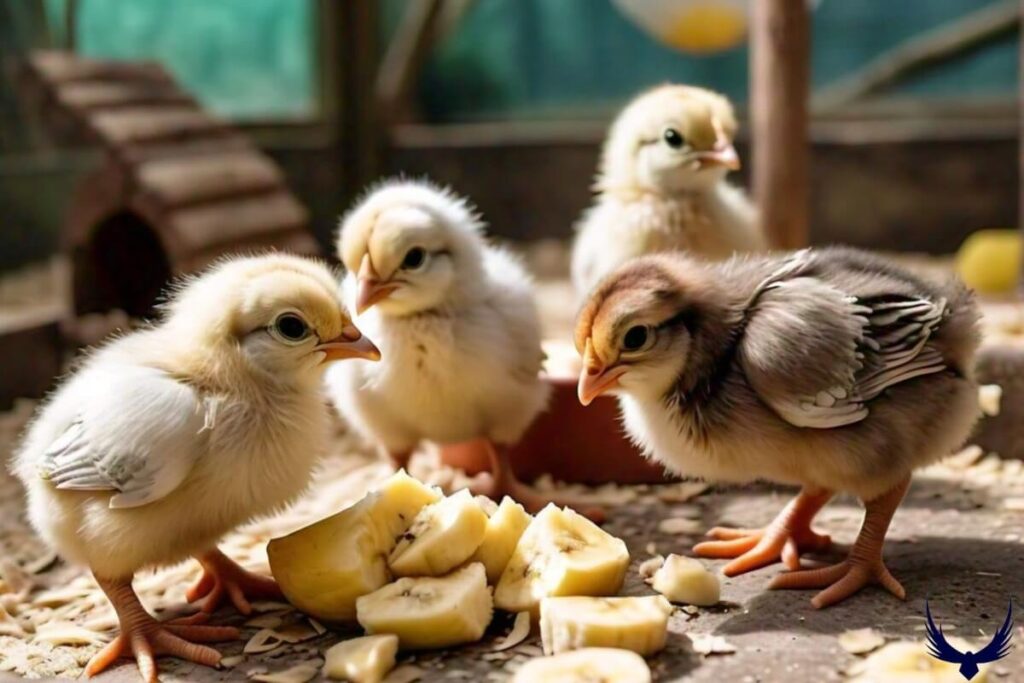
Mash the banana thoroughly to make it easier for them to eat. Give it to them once a week and make sure they mainly eat chick starter feed. Banana should be a rare treat for chicks, not a big part of their diet.
Are Bananas Good for Chickens to Eat?
Bananas are a healthy treat for chickens when offered in moderation. They have vitamins, minerals, and fiber which can support overall health and egg production. Bananas give quick energy because of their natural sugars and can keep chickens hydrated in hot weather.
When fed appropriately, bananas can contribute to a chicken’s nutritional variety and serve as an enjoyable snack for the flock.
Can Chickens Eat Banana Peels?
Chickens can eat banana peels but it’s better to give them the flesh instead. Banana peels are not toxic, they are tougher to digest and may contain pesticide residues if not organic.
If offered, banana peels should be thoroughly washed and cut into small pieces.
Do Chickens Like Bananas?
Most chickens do enjoy bananas as a tasty treat. The sweet taste and soft texture of ripe bananas are appealing to chickens.
Like humans, individual chickens may have their own preferences. Some chickens might be more enthusiastic about bananas than others.
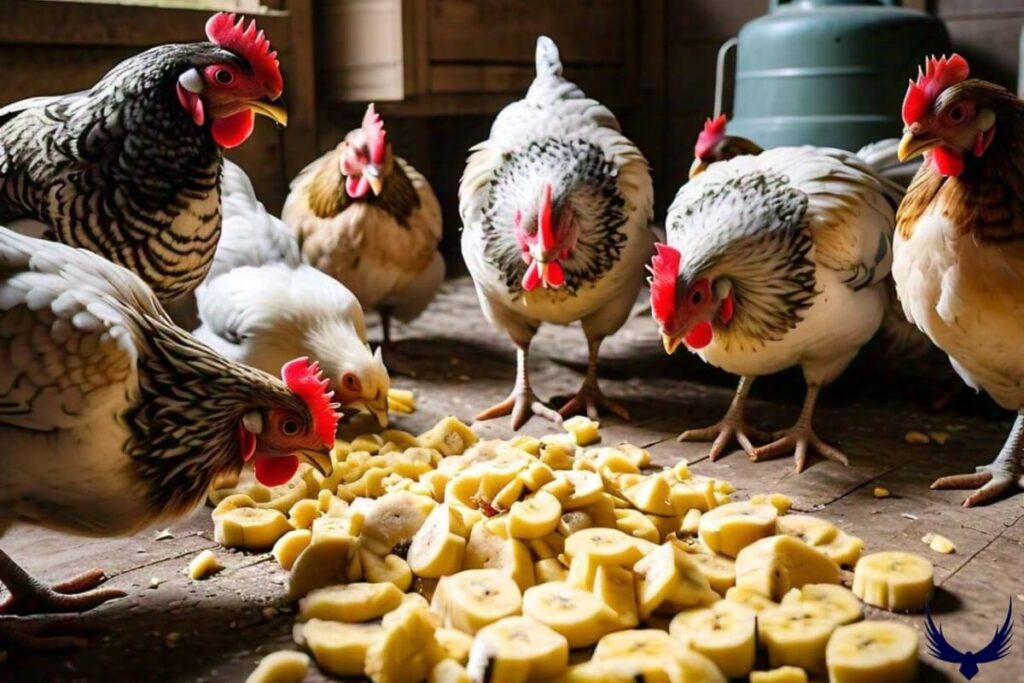
Offering small pieces of banana can be a good way to provide variety in their diet and serve as a form of enrichment. If your chickens seem to like bananas, it can be a healthy and enjoyable treat for them.
FAQs – Can Chickens Eat Bananas?
Can Chickens Eat Whole Bananas?
Chickens can eat whole bananas, but it’s better to peel and cut them into small pieces first. Whole bananas can be a choking hazard for smaller chickens. This preparation method ensures easier consumption and reduces the risk of choking.
Can Baby Chickens Eat Banana Peels?
It’s not recommended for baby chickens to eat banana peels. The peels are tough and hard for their young stomachs to digest. Chicks over 6 weeks can eat soft, mashed banana instead, but only a little bit as a treat once in a while.
Can Chickens Eat Banana Leaves?
Chickens can eat banana leaves, but they aren’t very nutritious. The leaves are tough and hard to digest in large amounts. They can be a fun snack for chickens to peck at but shouldn’t be a big part of their diet. If you give them banana leaves, make sure they’re clean, pesticide-free, and cut into small pieces.
Can Chickens Eat Frozen Bananas?
Chickens can safely eat frozen bananas. In fact, frozen banana chunks can be an excellent treat for chickens during hot weather. It’s best to partially thaw the frozen banana pieces before offering them to your flock to prevent any choking hazards. As with fresh bananas, frozen ones should be given in moderation as part of a balanced diet.

